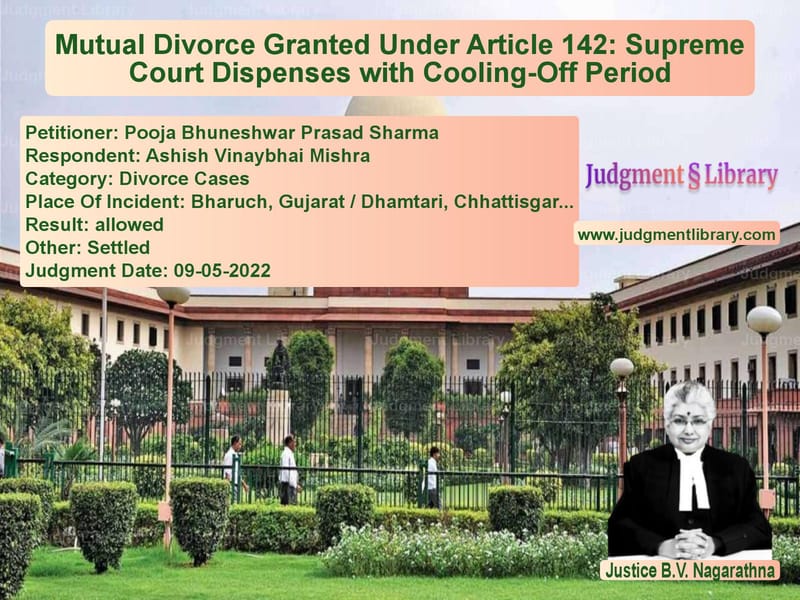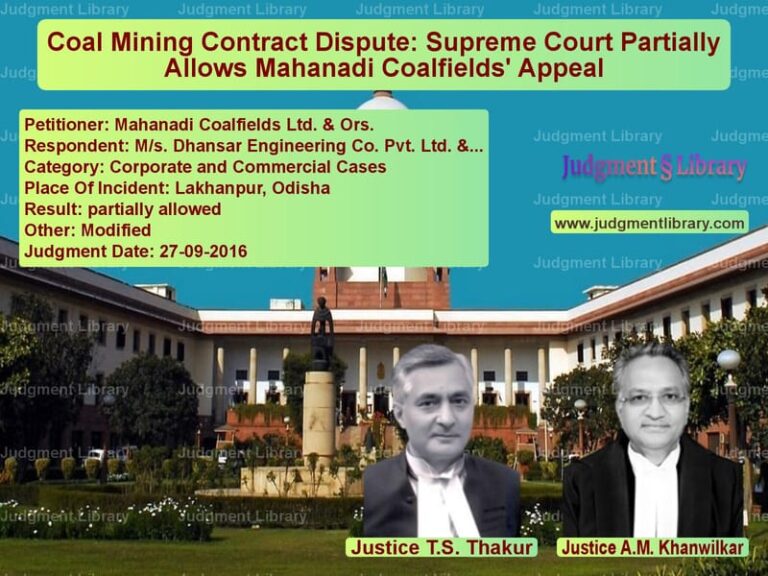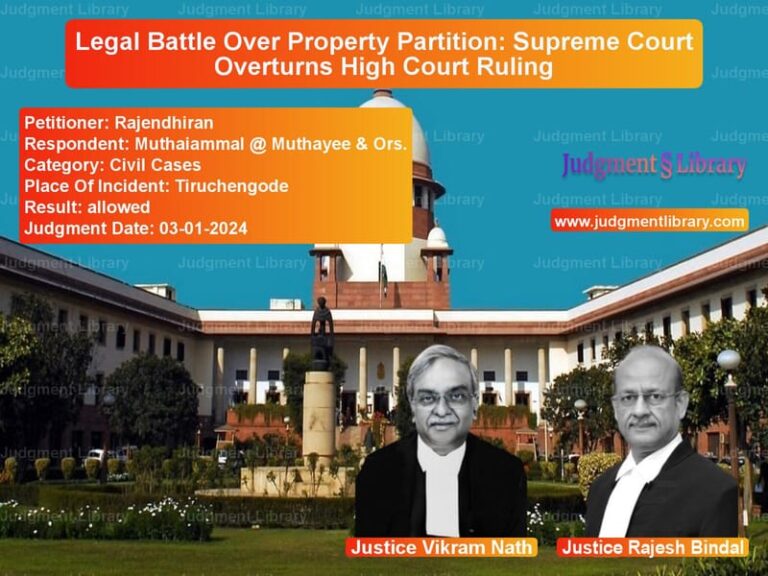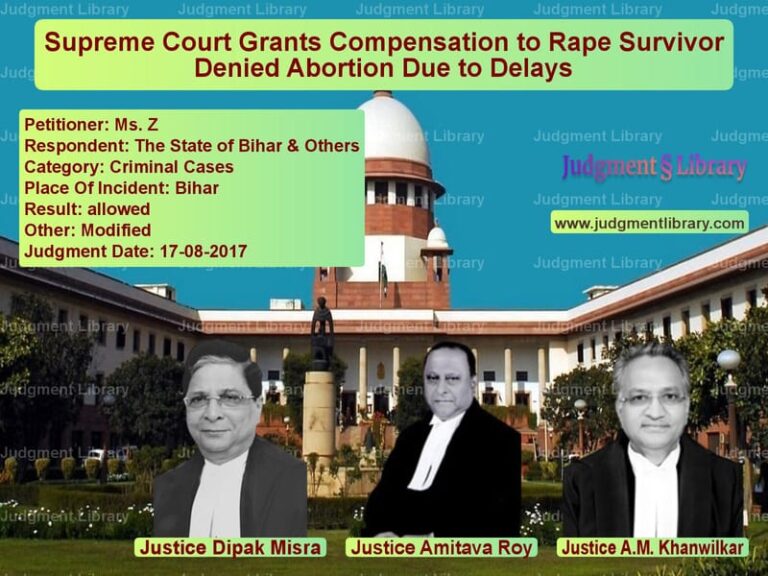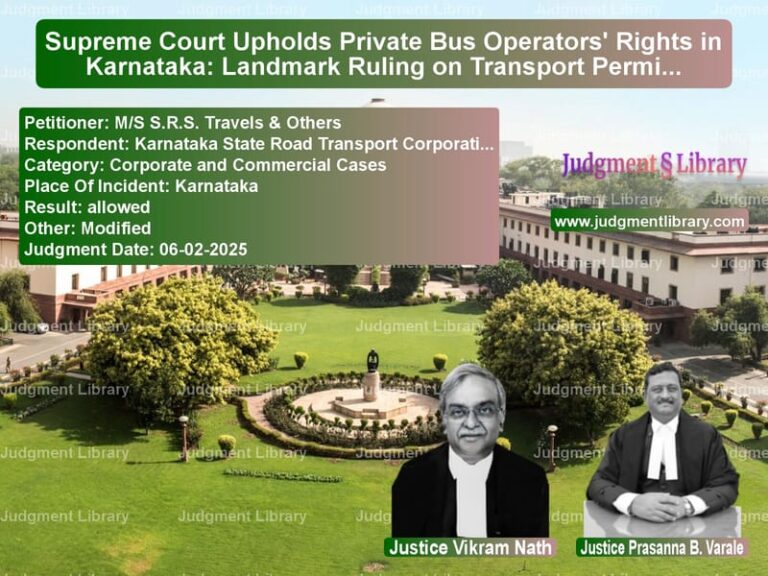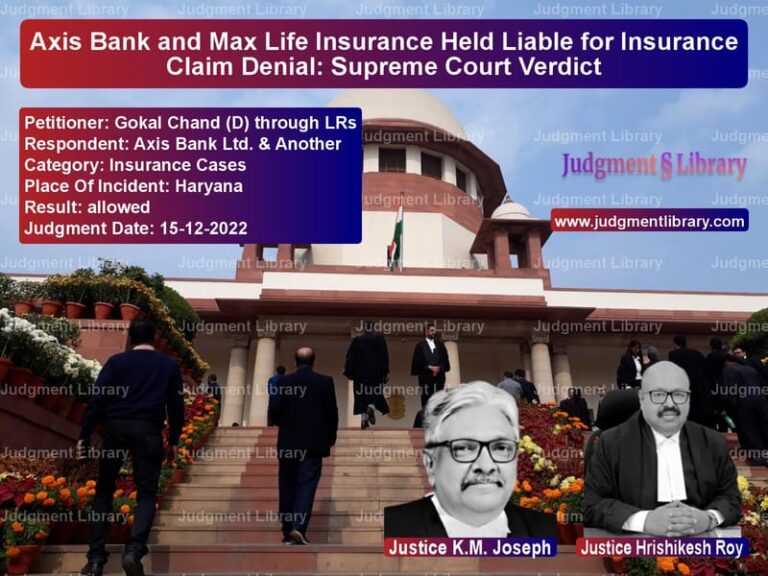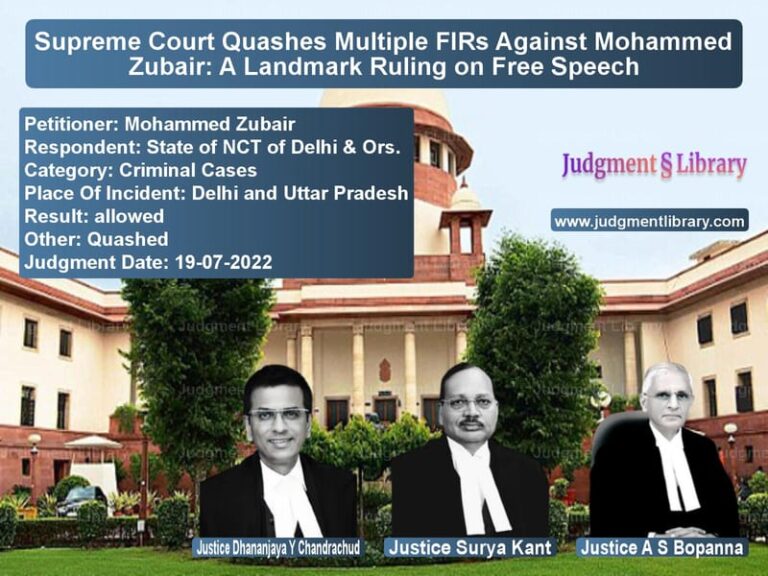Mutual Divorce Granted Under Article 142: Supreme Court Dispenses with Cooling-Off Period
The Supreme Court of India, in the case of Pooja Bhuneshwar Prasad Sharma v. Ashish Vinaybhai Mishra, delivered a landmark judgment on May 9, 2022, granting mutual divorce to a couple by exercising its powers under Article 142 of the Constitution. The judgment highlights the flexibility of the Court in matrimonial cases where both parties have agreed to dissolve their marriage and the necessity of procedural waivers in cases of irretrievable breakdown.
Background of the Case
This case arose from two competing transfer petitions filed by the husband and wife, each seeking to transfer their respective cases to a more convenient location:
- Transfer Petition by Wife: The petitioner-wife, Pooja Sharma, sought the transfer of H.M.P. No. 11 of 2021, filed by her husband for divorce, from the Family Court in Bharuch, Gujarat, to the Family Court in Dhamtari, Chhattisgarh, citing personal difficulties in attending proceedings in Gujarat.
- Transfer Petition by Husband: The respondent-husband, Ashish Mishra, filed MJC No. 54 of 2021 (maintenance proceedings initiated by the wife) and sought its transfer from Dhamtari, Chhattisgarh, to Bharuch, Gujarat, arguing that the proceedings should be conducted where he resides.
Since both petitions arose from the same matrimonial dispute, the Supreme Court heard them together and referred the parties to mediation.
Supreme Court Mediation and Settlement Agreement
During mediation, the parties reached a comprehensive agreement, leading to the following terms:
- Mutual Consent Divorce: Both parties agreed that their marriage had irretrievably broken down and decided to dissolve their marriage amicably under Section 13-B of the Hindu Marriage Act, 1955.
- Financial Settlement: The husband agreed to pay a lump sum amount of Rs. 28 lakhs to the wife. The wife confirmed receiving the amount in two installments and stated that she had no further financial claims.
- Return of Jewelry and Assets: The wife acknowledged receiving a necklace set from the husband and confirmed that she had no further claim over her husband’s property.
- Withdrawal of Pending Cases: Both parties agreed to withdraw all pending cases filed against each other within 15 days of the judgment.
The Supreme Court took the settlement agreement on record and proceeded with the final hearing.
Legal Arguments and Court’s Analysis
In granting mutual divorce, the Supreme Court examined the necessity of following the mandatory six-month waiting period prescribed under Section 13-B(2) of the Hindu Marriage Act. The Court cited its ruling in Amardeep Singh v. Harveen Kaur (2017) 8 SCC 746, which held:
Read also: https://judgmentlibrary.com/supreme-court-clarifies-limitation-period-in-domestic-violence-cases/
“The waiting period under Section 13-B(2) is not mandatory but directory. Courts can waive it if there is no possibility of reconciliation and both parties have agreed to divorce.”
The Court noted that the couple had been living separately for a considerable period and had resolved all issues through mediation. It stated:
“The statutory cooling-off period under Section 13-B(2) should not be an obstacle when the parties have already moved on and have no intention of reconciliation.”
The Court further observed that delays in mutual divorce proceedings could cause undue hardship and emotional distress, especially in cases where litigation is prolonged due to procedural requirements. Thus, it exercised its special jurisdiction under Article 142 of the Constitution.
Waiver of the Six-Month Cooling-Off Period
In normal circumstances, couples seeking divorce by mutual consent under Section 13-B of the Hindu Marriage Act must file a joint petition and wait for six months before the final decree is granted. However, the Supreme Court clarified that:
- If the marriage is irretrievably broken, the waiting period can be waived.
- If both parties have amicably resolved all financial and custodial matters, the cooling-off period serves no purpose.
- Courts should not compel estranged couples to remain in a legally binding marriage when both are willing to part ways.
By exercising its powers under Article 142, the Supreme Court granted an immediate divorce to the couple, noting:
“The purpose of the six-month period is to allow time for reconsideration. In this case, the parties have already made up their minds, and further waiting would serve no benefit.”
Key Takeaways from the Judgment
- The Supreme Court reaffirmed that the six-month waiting period under Section 13-B(2) of the Hindu Marriage Act is not absolute and can be waived under special circumstances.
- Article 142 empowers the Supreme Court to grant complete justice in matrimonial disputes by overriding procedural delays.
- Mediation remains a powerful tool in resolving matrimonial disputes without prolonged litigation.
- Couples seeking mutual divorce should ensure that all financial, custodial, and legal matters are settled before approaching the court.
Conclusion
The Supreme Court’s ruling in Pooja Bhuneshwar Prasad Sharma v. Ashish Vinaybhai Mishra sets a significant precedent for streamlining mutual divorce procedures in India. By waiving the statutory cooling-off period, the Court has reinforced the principle that legal formalities should not obstruct justice when both parties are in agreement.
For estranged couples, this judgment serves as a reminder that the judicial process can facilitate rather than hinder the resolution of matrimonial disputes. The Court’s proactive approach ensures that legal procedures align with the evolving realities of modern relationships.
Petitioner Name: Pooja Bhuneshwar Prasad Sharma.Respondent Name: Ashish Vinaybhai Mishra.Judgment By: Justice B.V. Nagarathna.Place Of Incident: Bharuch, Gujarat / Dhamtari, Chhattisgarh.Judgment Date: 09-05-2022.
Don’t miss out on the full details! Download the complete judgment in PDF format below and gain valuable insights instantly!
Download Judgment: pooja-bhuneshwar-pra-vs-ashish-vinaybhai-mis-supreme-court-of-india-judgment-dated-09-05-2022.pdf
Directly Download Judgment: Directly download this Judgment
See all petitions in Mutual Consent Divorce
See all petitions in Alimony and Maintenance
See all petitions in Property Division in Divorce Cases
See all petitions in Judgment by B.V. Nagarathna
See all petitions in allowed
See all petitions in settled
See all petitions in supreme court of India judgments May 2022
See all petitions in 2022 judgments
See all posts in Divorce Cases Category
See all allowed petitions in Divorce Cases Category
See all Dismissed petitions in Divorce Cases Category
See all partially allowed petitions in Divorce Cases Category

